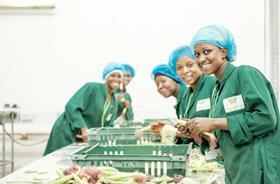
Since early 2020, the Covid-19 pandemic has exerted enormous pressures on global, regional and national health systems, disrupting both economies and trade. At the same time, climate change poses a severe threat to the agricultural sector of many economies, seen in increasing droughts, floods, forest fires and new pests. According to Coleacp, the Brussels-based organisation that helps producers in African, Caribbean and Pacific (ACP) countries to access the EU market, agri-food MSMEs in member countries have been especially affected.
Crisis presents opportunity
However, Coleacp spies new possibilities for investment in green and digital recovery strategies, led by sustainable export value chains. Since 2016, two European Union-funded Fit For Market programmes, implemented by Coleacp, have been working with the private and public sectors in the ACP horticultural sector, focusing on enhancing the sustainability of businesses (Fit For Market) and sanitary and phytosanitary compliance (Fit For Market SPS).
Now a new five-year programme funded by the EU and the OACPS (Organisation of ACP states) – FFM+ (Fit For Market Plus) – is building on these partnerships and achievements. 'The aim of FFM+ is to mitigate the impacts of the pandemic,' Coleacp stated, 'and at the same time seize the current opportunities to strengthen horticultural value chains to make them sustainable and resilient.'
Why “Fit For Market Plus”?
According to Coleacp, there may be severe challenges at present, but there are also new opportunities, including greater support for sustainable development in line with the green, climate-resilient ambitions of regions and nations.
'FFM+ is based on sustainable intensification– increasing production while minimising negative impacts on climate, ecosystems and the overall productive environment,' Coleacp explained. 'The new programme will support the transition of ACP horticulture towards more sustainable food systems, addressing the priority areas identified in the Farm to Fork strategy of the European Green Deal: reducing dependency on pesticides and antimicrobials, reducing excess fertiliser use, increasing organic farming and reversing biodiversity loss.'
Activities are also set to address the social and economic dimensions of sustainability, including livelihoods, economic viability, social justice and inclusiveness, with an emphasis on participation by smallholders, especially young people and women.
FFM+ is carried out within Coleacp's Sustainability Framework. 'Focusing on the business case means that adopting good practices not only facilitates market access, but also genuinely helps suppliers run more efficient, profitable and resilient businesses,' the organisation stated.
Technical and business support and training will be delivered through Coleacp’s network of 1,200 ACP-based experts and its distinctive “cascading” training method, designed to be passed on by participants to their own colleagues and workers in order to magnify the impact. FFM+ will also establish a support framework to reinforce business links between smallholders, farmer groups and MSMEs.



